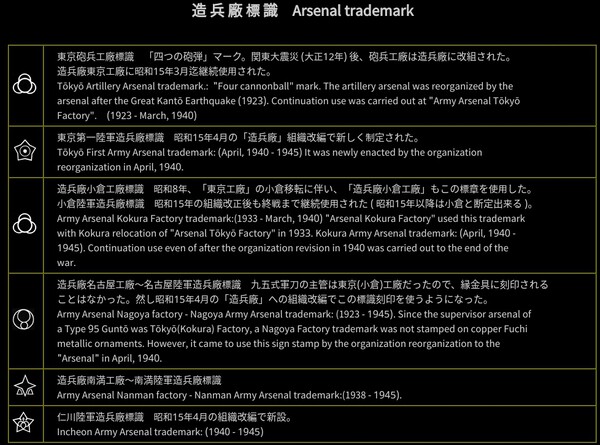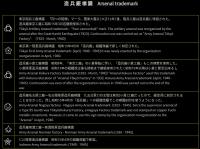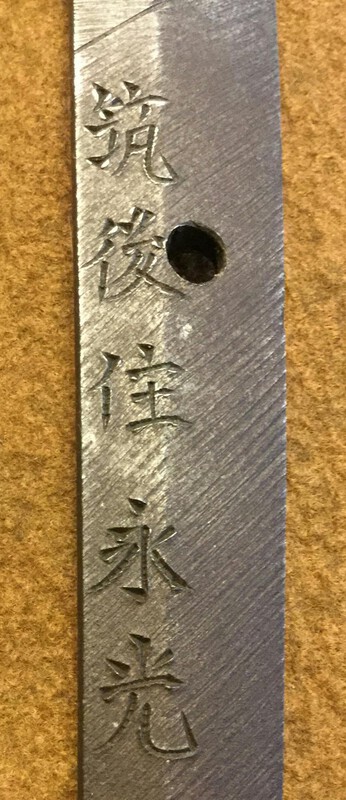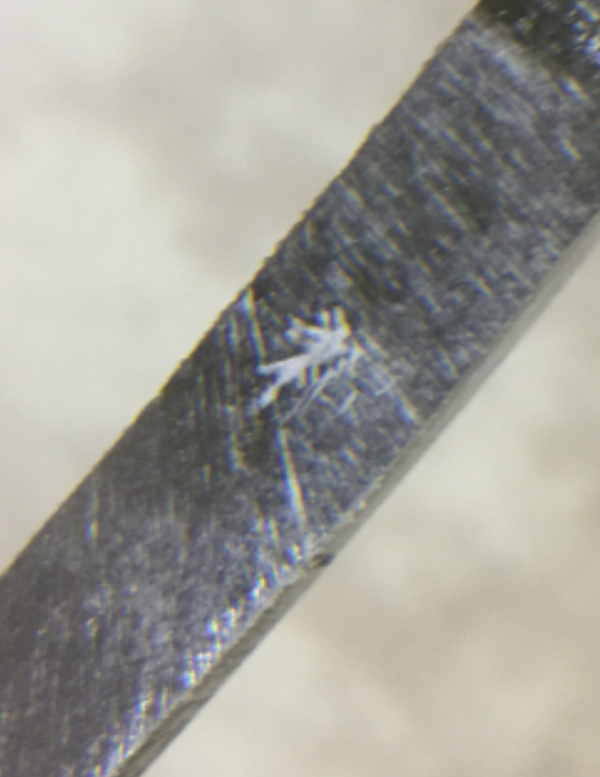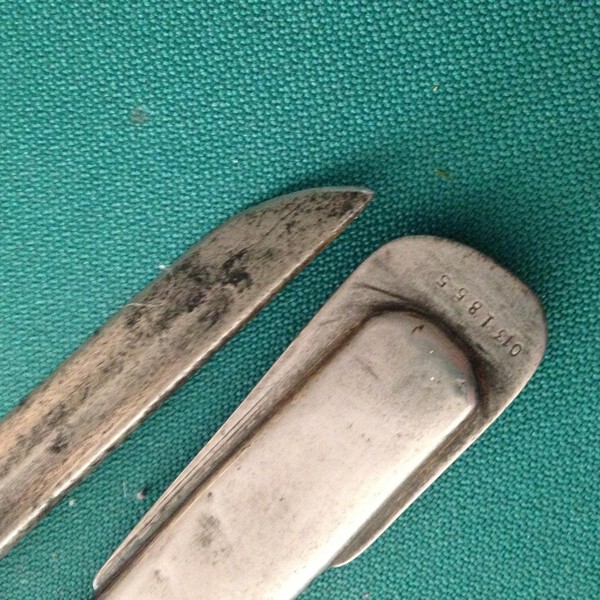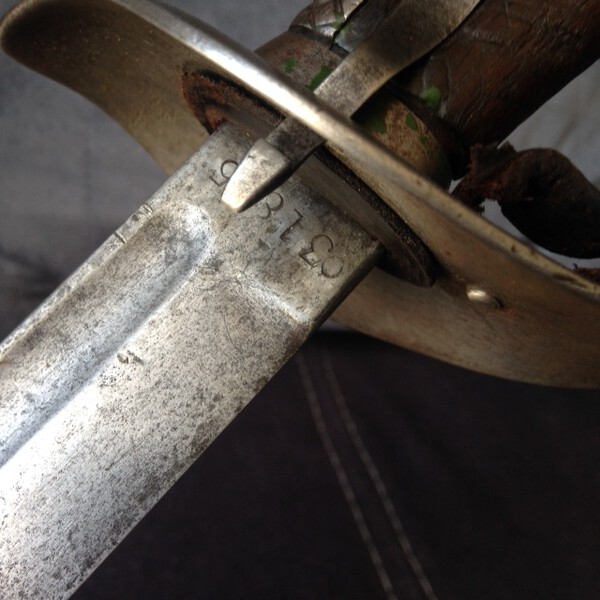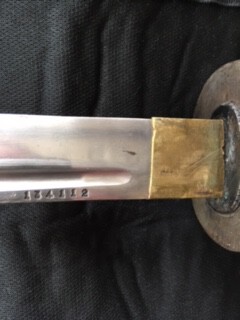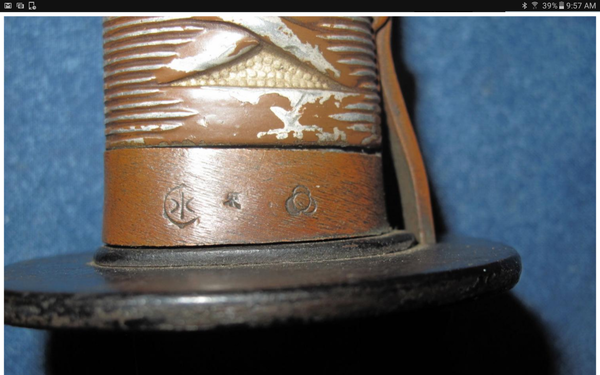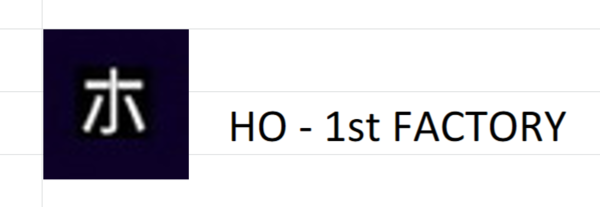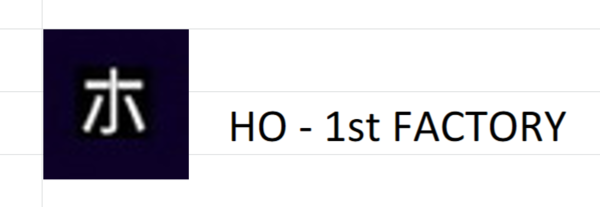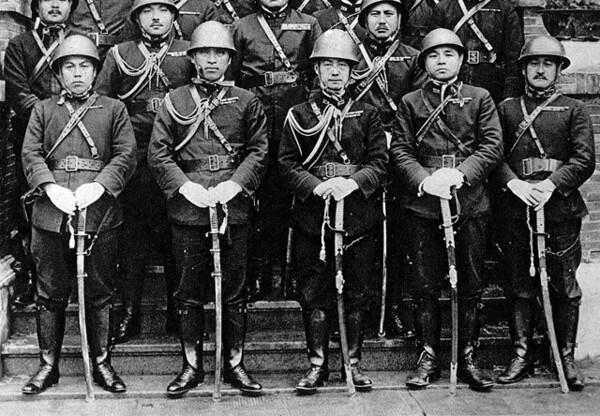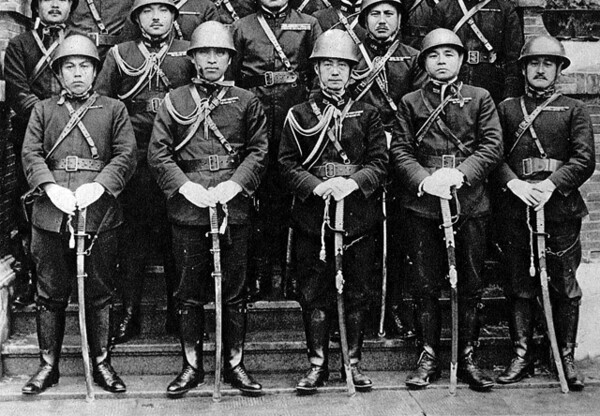-
Posts
12,896 -
Joined
-
Last visited
-
Days Won
154
Everything posted by Bruce Pennington
-
Agree with Stephen, nice Japanese WWII officer gunto! The string-wrapped saya (scabbards) are rare and I would consider them a collector's item because of that. The fact that it was done by sailors returning from the war just adds to their wartime history.
-

To Polish Or Not To Polish?
Bruce Pennington replied to IJASWORDS's topic in Military Swords of Japan
Thanks David, I like his work, and this is a Mantetsu blade, not a high-art blade. -

To Polish Or Not To Polish?
Bruce Pennington replied to IJASWORDS's topic in Military Swords of Japan
Thanks for the reminder David! I just sent an email to David Hofhine to make sure, but I think I told him about the blade when I first contacted him. We'll see what he says. I'm also checking into a shirasaya maker, now that you mentioned it! -
Brad, There were rare NCO gunto without the fuller groove (bo-hi), but rare. Likewise, there were rare officer gunto WITH fuller grooves. The hamon on war gunto was usuallly straight, not wavy, and late in the war, the details were often hard to see. The blade was still tempered though. You got a decent price for an officer gunto with leather saya cover. I'm still bothered by the high-shine brass looking hand-guard (tsuba). It looks newly made with fine detail, styled in the early-years pierced tsuba. But if it were late-war, then it very well could have been "newly" made, before the war ended. Nice war piece! Of course, you're going to have to treat us to a couple of pics of your 32's!
-
Brad, I assume these are the pics the seller provided? Better pics would help, obviously. Personally, I hate trying to evaluate this kind - it's either a really good reproduction, or a fair to poor legit gunto. Positives - The metal is NOT the Damascus steel that is common in fakes; the styling of the handle fittings are proper; Iffy's - While I've seen black same' on army gunto, this looks imitation (pending better photos); the fittings are poorly made; the tang is muey-ugly! I've seen lots worse, but if this was Japanese made, the tang was made by a moderately unskilled worker! If you got it at a good price, so be it; but I hope you didn't pay "a lot." (subjective terms admittedly!)
-

To Polish Or Not To Polish?
Bruce Pennington replied to IJASWORDS's topic in Military Swords of Japan
Neil, I tossed and turned on the same decision about my Dad's Koa Isshin. It's got lots of stains and scratches that give it the "used in combat" (or on some poor hapless Chinese) that is tempting to preserves as-is; but it's Dad's. So I've decided to have it polished. Sentimental reasons only. You know that there are really good polishers out there that can do it for around $2,000, right? That's what I'll be paying for mine, when my turn comes up this Spring. -
Stephen, amazingly I was running that same thought through my head as you must have been typing it! David, yes, I have been delving fairly deep into Type 95 NCO gunto for some time lately. They have large "Arsenal" stamps and alongside, there are small "inspector" stamps. Yes, the inspectors are tied to the arsenal, and just seeing the inpector stamp immediately identifies the blade's arsenal, but the two are there for different reasons. It's like buying a new shirt. On the tag is the maker's name, say Land's End. Usually, also, inside you'll fid a little paper sticky with the quality control inpector's number that we always peel off and discard. The inspector's sticky is not the same as the maker's name and is there for different reasons. So, yes, we're (or I) having a semantics problem! the "Arsenal Stamps" thread has become much more than just a collection of arsenal stamps. There are swordsmith (I've forgotten the official term) personal hotstamps. There are area swordmith guild stamps (Gifu, Seki), there are quality stamps (star, showa), there are patent stamps, etc. Yes, most of those are used and put on by arsenals, but they are not the trademark (to use Ohmura's term) of the arsenal. So, I realize I must broaden my scope when I read someone ask about "arsenal" stamps! The stamps have become a bit of a secondary hobby interest for me, so I'm just going to have to seek clarification with the question asker before launching into my answer. Good discussion guys, thanks!
-
Neil, yes I've seen stamps on koshirae, but even that one is more an inspector stamp rather than the arsenal stamp; but I meant the blade itself. David, Like I said, my experience is QUITE limited as I've only been studying gunto for a little over 2 years. And one of my lessons learned is "never say never!" Would you think it fair to say that it's rare to see arsenal stamps (not inspector stamps) on Army gunto? I'd say it's slightly more common to see inspector stamps, like Na and To on Army gunto, but even that is PROBABLY less than 50%, seems to me.
-
David, I'm specifically speaking of Arsenal stamps - Kokura, Tokyo, Nagoya, Incheon, even Mantetsu. Sure, you'll see Star, Showa, even Seki; but I can't say I've ever seen an Arsenal stamp on an Army blade. Navy, sure, Tenzoshan (sp?) and Toyokawa, but even those are, what, 50% or less on Navy gunto?
-
In my limited experience, I'd say Army gunto almost never have an arsenal stamp. Navy gunto sometimes have arsenal stamps (50% or less). NCO gunto always do.
-
Steve, It's on a 1945 blade with a chippy Seki-style smith name of "Nagamitsu". It's a bit puzzling because it's clearly not the famous Nagamitsu (wrong "Naga" kanji), plus the Naga kanji is right for a Seki naga, but the only Seki Nagamitsu I can find even uses a different kanji. This naga is used in other smith names, but not in the Nagamitsu, as far a I can find.
-
Here's an odd one: Looks like the kanji "So" as in Soshu, or made by. Does "So" by its self mean "made"?
-
Very good! Here's mine. You can see the file marks, and for some reason they added an extra "1" in the number
-
Very nice piece, Neil! Is it Ko or Otsu? Would it be fair to say the 2 numbers on the other side look lined out with horizontal lines? Don't know why they would do that versus filing them off, like others I've seen.
-

Show Us Your High Class Gunto
Bruce Pennington replied to lonely panet's topic in Military Swords of Japan
And honestly, Neil, you haven't "done" anything to it, any more than the original owner would have done regularly himself. But I understand. It is "preserve as is" collector practice, which is cool. -

Show Us Your High Class Gunto
Bruce Pennington replied to lonely panet's topic in Military Swords of Japan
???? -
Yes, Ed, thanks for the link! I enjoyed reading about both the knots and the ito wrapping styles!
-
Neil, I believe I have read that this was a patent number. It is described on Ohmura's site, but it's in Japanese: 右より 實用新案特許 若瀬軍刀製作所(東 京市芝區)の商標 裏: 第213917號 I think that's the same number as yours, so it most likely is a patent number and not a serial number. As always, leave it to you to have a very beautiful example of every variation of the gunto!!! I love it!
-
Ahhhh, thanks I needed that !!! Similar number range. Mine is 134112, with the same Nagoya inspector stamp:
-
Neil, From Stegel's post on my thread: " "The Nagoya Arsenal (in the 132k range under Kokura) stopped the production of the previous Pattern 3 (Aluminium handle with top lock latch/steel tsuba) and moved it to the 200k range. This was later followed by the side lock version, resulting in this pattern being found in both ranges (100k and 200k)." I have a "Na" stamp on the blade next to the serial number, one on a seppa, and one on the saya drag. It is the only stamps on mine. As to serial number ranges, maybe Shamsy or Stegel can say. BTW, you're not going to leave us with that one single solitary pic are you?!?!?!
-
I don't recall seeing these stamps on this thread yet (if it is, please let me know and I'll delete this!) From Alex, as seen for sale via the web, a contractor and inspector stamp on a Kokura Arsenal Type 95 gunto. As far as I can find, the contractor stamp is legit, but classed "Unknown". Any ideas on the inspector stamp? My guess is the "Ho" of Kokura 1st.
-

Unknown Company Marked Logo Japanese Nco Sword
Bruce Pennington replied to karagoz's topic in Military Swords of Japan
Alex, Stegel of Shamsy would be the guys who would know this for sure, but the contractor stamp on the left, as far as I know is a recognized legit stamp, but falls into the "Unknown" category. I'm more stumped by the center inspector stamp. It's possible it is the "Ho" of the Kokura 1st Also, I don't recall seeing these on the "Stamps" thread, so if you don't mind, I'm going to reference your post and add it there. -

Authentic Ww2 Japanese Cavalry Sword?
Bruce Pennington replied to barnejp's topic in Military Swords of Japan
Thanks Joe & Steve! I've lent out my reference books to my brother, or I'd have looked that up myself. -

Authentic Ww2 Japanese Cavalry Sword?
Bruce Pennington replied to barnejp's topic in Military Swords of Japan
Guys, I don't follow this style so I have very little to go by, is there anything beyond the serial number that bothers you. Asking for the education, not to argue. The pics are poor quality, but the sabre seems to look good. These type of gunto did come with scabbard drags (pic below from Ohmura's site) Greg, do you have some better pics, like a view of the handguard basket, and closeups of the handle backstrap? -
Steve & Stegel - I completely agree with Neil - THANK YOU! These are fabulous!!! And Neil- my folks lived out in the countryside of east Texas. Everytime I drove through that area, with it's old homesteads full of retired old folks, I can't help but look at each house as I go by and think "I bet there's a great gunto leaning in the closet of that house!!!"



